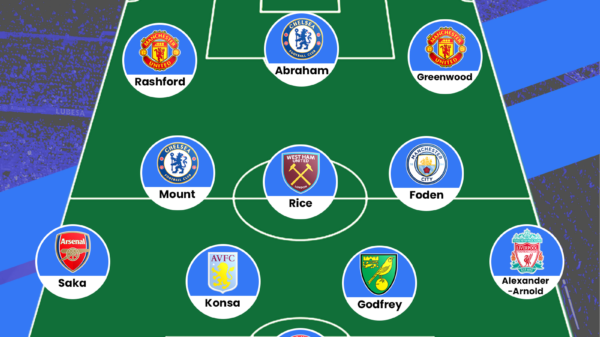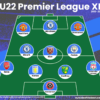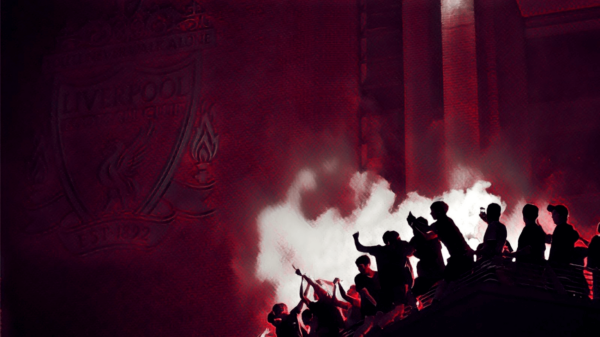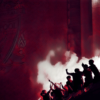On Sunday, the 5th of May, Chelsea traveled to Old Trafford, in what was a crucial game for the Blues, as the pressure was on them to produce a result. The freshly crowned champions of England had a point to prove to Chelsea, who had dumped them out of both domestic cup competitions earlier in the season.
The home side lined up in a 4-2-3-1 with Lindegaard given a go in goal. The back 4 consisted of Evans, Vidic, Rafael and Patrice Evra. Tom Cleverly and Phil Jones were played in midfield, with Anderson pushed slightly higher up the pitch. van Persie was the striker, and Giggs and Valencia started on the wings.
The European champions also began in their usual 4-2-3-1. Cech started behind Ivanovic, Luiz, Cole and Azpilicueta. The midfield was patrolled by Ramires and Frank Lampard. Up front, Ba started, but behind him, only Oscar and Mata were present from the ‘3 Amigos’, as Hazard sat out with a calf strain. Victor Moses filled in for the Belgian.

via our very own Tactics Creator app.
Click here to make your own!
Analysis
As the away team had to chase the game for the win that they so badly needed, United were comfortable playing on the counter, and they tried just that. The team sat a lot deeper than usual, looking to soak up pressure, and then use the dynamism of their midfielders to break and score. Sitting deeper meant that the defence was very organised, and were quite capable of preventing through balls being played behind them, and being broken down in this fashion. Thus they restricted Chelsea’s attacks primarily to efforts from range.
The midfield combination of Jones, Cleverly and Anderson were deployed to provide energy and running in the middle of the park. This kind of energy and running were critical to United’s counter attacking play, as it would help them break Chelsea’s attacks down, and launch their attacks. The assumption for playing in such a way was that Chelsea would look to pass the ball through to their attacking players. This sort of a tactic (Chelsea’s midfield weakness) has worked well in the past, with City exploiting it well in the FA Cup final.

United-staying deep
via whoscored.com
Chelsea, as they did in the FA Cup semi against City, got past this problem by playing the ball over the midfield, and using long balls (61). This tactic worked very well for the Blues. As United were looking to sit back and defend, the pressure on the Chelsea back line wasn’t much. This allowed their defenders to play the ball. Luiz especially took advantage of this, and had a number of forays forward. He attempted 9 long balls in total, of which 6 were successful, and 1 was a key pass. Branislav Ivanovic attempted 7 long balls, of which 3 were successful. Due to the fact that so many long balls were played out of the back, Ba and the attacking midfielders had a lot of the ball in the opposition half, as Chelsea managed to win a number of second balls. The lack of pressure on the back 4, along with United sitting back also meant that the full backs needed to push forward to add numbers and width to the attacks, which they did.

David Luiz long balls
via squawka.com
With the title wrapped up, and their season all but over, many expected that a lack of hunger may be shown by the United players. Of course, their passionate manager Sir Alex worked hard to ensure that this wasn’t the case, but he should be very disappointed by the efforts of a certain French left back. Evra, who has enjoyed something of a rennaissance this season, had a distinctly poor game in defence. He was well beaten by whoever patrolled the right hand side of the Chelsea midfield. Chelsea didn’t particularly focus on the right hand side, with 36% of their attacks coming from there (highest, but the centre and left had 33% and 31% respectively, not too far behind) but every single cross they attempted in the game, excluding corners, came from their right and United’s left hand side. Numerically speaking, that’s 15 crosses, which is an amazing stat. It’s a tribute to how well Vidic, and Evans defended that not a single one reached it’s target. In fact, Vidic and Evans put together, had 6 interceptions, and 24 clearances.
Another reason for Chelsea experiencing difficulty converting their crosses was the keeping of Anders Lindegaard. Since his last start at Reading, where he had trouble dealing with set-pieces, Lindegaard seems to have worked hard, and seemed quite confident to come off his line and intercept the ball. This resulted in punches out and catches as well. Due to his confidence in dealing with such threats, Chelsea were forced to look for other avenues to threaten from their set pieces. They found an innovative method of doing so. The corners were aimed away from the keeper, so as to win aerial duels, and then the second ball. In one such corner, which was flighted to the edge of the penalty area, Ivanovic won the initial header, and found Frank Lampard, who couldn’t convert the knockdown as he was crowded out. Credit to Lindegaard and United for making Chelsea look at such options though, and cutting out a good avenue for a team that has scored 23 of their 68 goals this season from set pieces.

Corners that were played away from the keeper found their target.
via squawka.com
As the game wore on, Sir Alex looked to go for the winner, and accordingly, made attacking substitutions. Going for the kill also meant that the style, which was primarily a defensive one up until this point had to be changed. To serve this purpose, he brought on Wayne Rooney, and moved Ryan Giggs to the centre of midfield. Jones was left on as he had the dynamism and physical presence to cover for Giggs, and Giggs was moved to the centre to utilise his passing range. The aim was to play balls in behind the Chelsea defence, which was quite high up the pitch, and so it made sense to bring on the Rooney, as he is the player who has linked up well with van Persie, and in any case, has the creativity to make things happen for United. Out wide, Giggs was replaced by the young Dutchman, Alexander Buttner. Buttner has shown this season that he is good going forward, and was brought on to provide cover to Patrice Evra alongside his attacking duties. This substitution was made in the 68th minute, and worked quite well, as it stemmed the flow of crosses into the box from the left hand side. Only 2 crosses out of the 15 that Chelsea played from this side were made after the introduction of Buttner.
The additional thrust in attack meant that United were bound to leave spaces open at the back, and this proved to be the case, as Chelsea caught United out with a late goal from a counter attack. Juan Mata scored after the ball deflected off a retreating Phil Jones, and this was enough to get Chelsea the 3 pointsthey needed.
Conclusion
In a game where 3 points were needed by the Blues, it would have been easy for Rafa to throw caution to the wind and chase the game, but this tactic would have played right into the hands of the home team. Instead, his experience told him to be patient, and wait for the opposition to commit a mistake, which Sir Alex did, by going for the win that wasn’t really necessary. The pre-match winding up by Rafa was also probably a ploy to get Fergie to attack a little, and look for the win, though the old Scot probably didn’t need the added motivation. At the end of the day, it was a well deserved win for the Blues, who will go into their mid week clash with Spurs full of confidence. For the champions, it is a minor set back, that affects their ability to get another record (most wins in a season), but not one that will bother them much.
All stats via whoscored.com and squawka.com
- Analysis: Are Chelsea’s pressing issues a concern? - October 5, 2020
- Has Financial Fair Play Been Worth It? - August 27, 2020
- Tactical Philosophy: Frank Lampard - May 20, 2020




























































